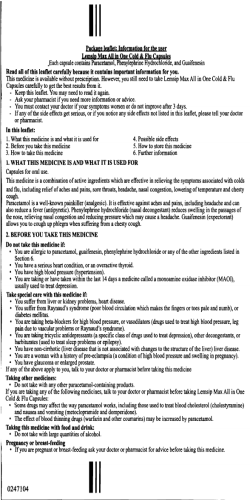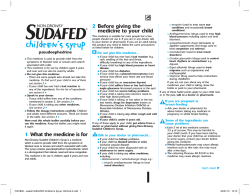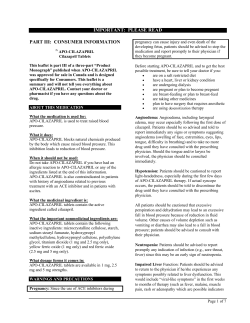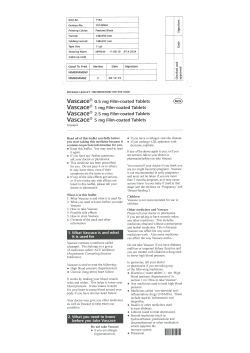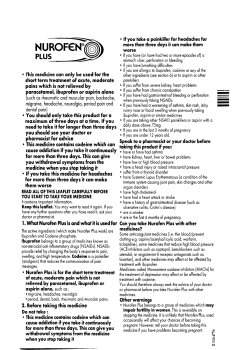
GUAIFENESIN What is in this leaflet
New Zealand Consumer Medicine Information GUAIFENESIN What is in this leaflet The medicine you have purchased contains guaifenesin. (May also be spelt guaiphenesin) This leaflet is intended to provide information on the active ingredient guaifenesin, which is contained in many different medicines. The packaging of the medicine you have bought should be read carefully. This leaflet provides additional information on guaifenesin which should also be read and understood. Please follow the instructions on the packaging of the medicine you have purchased and in this leaflet before you start using guaifenesin. This leaflet answers some common questions about guaifenesin. It does not contain all the available information. It does not take the place of talking to your doctor or pharmacist. All medicines have risks and benefits. If you have any concerns about using this medicine, ask your doctor or pharmacist. Keep this leaflet with the medicine. You may need to read it again. What guaifenesin is used for Guaifenesin is an expectorant which thins and loosens mucus (phlegm) to help relieve chest congestion. There may be more than one active ingredient in your medicine, such as paracetamol, ibuprofen or an antihistamine. If you are taking more than one cough and cold medicine, please read the packaging of all the cough and cold medicine carefully to ensure you are not taking the same active ingredient from 2 or more medicines. Taking the same active ingredient from more than one medicine could mean you are taking too much of that active ingredient. Ask your doctor or pharmacist if you have any questions about guaifenesin. Before you use guaifenesin. When you must not use it Guaiphenesin CMI Do not use guaifenesin: in a child under 6 years of age. if you have an allergy to guaifenesin or any of the ingredients listed on the packaging of the medicine you have purchased. Some of the symptoms of an allergic reaction may include: shortness of breath wheezing or difficulty breathing swelling of the face, lips, tongue or other parts of the body rash, itching or hives on the skin. Do not take this medicine after the expiry date printed on the pack or if the packaging is torn or shows signs of tampering. If it has expired or is damaged, return it to your pharmacist for disposal. If you are not sure whether you should start using guaifenesin, talk to your doctor or pharmacist. Before you start to use it Talk to your doctor or pharmacist before taking this medicine if you: Have allergies to any other medicines, foods, preservatives or dyes. Have, or have had, any of the following medical conditions: o asthma o bronchitis o chronic obstructive pulmonary disease (COPD) o emphysema o smoker’s cough o porphyria, a rare blood pigment disorder Tell your pharmacist or doctor if you are pregnant or plan to become pregnant. Your pharmacist or doctor will discuss the benefits and possible risks of taking the medicine during pregnancy. Ask your pharmacist or doctor about taking guaifenesin if you are breastfeeding. It is not known if guaifenesin passes into the breast milk. Your pharmacist or doctor will discuss the potential benefits and risks of taking the medicine if you are breastfeeding. Do not use guaifenesin in children under 6 years of age. Ask your doctor or pharmacist before using guaifenesin in children aged 6-12 years. If you have not told your pharmacist or doctor about any of the above, tell him/her before you start taking guaifenesin. Taking other medicines Guaiphenesin CMI Tell your doctor or pharmacist if you are taking any other medicines including any that you get without a prescription from your pharmacy, supermarket or health food shop. Tell your doctor or pharmacist if you are taking any other cough and cold medicines. You should also tell any health professional who is prescribing a new medication for you that you are taking guaifenesin. Please note that guaifenesin may interfere with certain urinary diagnostic tests. How to use guaifenesin Follow any directions given to you by your pharmacist or doctor carefully. They may differ from the information contained in this leaflet. Read the packaging and this leaflet carefully before taking guaifenesin. If you do not understand the instructions on the packaging, ask your pharmacist for help. How much to take Follow the instructions on the packaging of the product you have purchased. You may also wish to discuss how much to take and when to take it with your pharmacist or doctor. Doses for adults are very different to doses for children over 6 years of age, please check the packaging carefully. Doses of guaifenesin are usually taken 4 hourly as required, with a maximum of 4 doses in any 24 hour period. Do not take more than the amount recommended on the packaging of the medicine you have purchased. The maximum recommended adult dose of guaifenesin is a total of 2400mg per day. Guaifenesin does not need to be taken with food. If the symptoms persist for more than a few days, or worsen, consult your doctor or pharmacist. If you forget to take it Take it as soon as you remember, and then go back to taking your medicine as you would normally. Do not take a double dose to make up for the dose that you missed. Guaiphenesin CMI This may increase the chance of you getting an unwanted side effect. If you are not sure what to do, ask your pharmacist or doctor. While you are using guaifenesin Things you must do Talk to your pharmacist or doctor if your symptoms do not improve. Your pharmacist or doctor will assess your condition and decide if you should continue to take the medicine. If you are about to be started on any new medicine tell your doctor or pharmacist that you are taking guaifenesin. Things you must not do Do not give guaifenesin to anyone else, even if they have the same condition as you. Do not take guaifenesin to treat any other complaints unless your pharmacist or doctor tells you to. Do not take more than the recommended dose unless your doctor tells you to. Things to be careful of Be careful driving or operating machinery until you know how guaifenesin affects you. In case of overdose If you take too much (overdose) Immediately telephone your doctor or the National Poisons Centre (telephone 0800 POISON or 0800 764 766), or go to accident and emergency at your nearest hospital, if you think that you or anyone else may have taken too much guaifenesin. Do this even if there are no signs of discomfort or poisoning. You may need medical attention. Overdose with guaifenesin is unlikely to produce toxic effects since its toxicity is low. Very large doses may cause nausea and vomiting. Side Effects Guaiphenesin CMI Tell your doctor or pharmacist as soon as possible if you do not feel well while you are using guaifenesin. All medicines can have side effects. Sometimes they are serious, most of the time they are not. You may need medical treatment if you get some of the adverse effects. Ask your doctor or pharmacist to answer any questions you may have. If you experience any of the following stop using the medicine and seek immediate medical help: difficulty in breathing, swelling of the face, neck, tongue or throat (these are signs of a severe allergic reaction). Guaifenesin may occasionally cause nausea or vomiting, stomach pain. This usually only occurs when more medicine is taken than recommended on the packaging. Other adverse effects not listed above may also occur in some patients. Tell your doctor if you notice any other effects. Do not be alarmed by this list of possible adverse effects. You may not experience any of them. After using guaifenesin Storage Keep your medicine in the original pack until it is time to take it. Do not store above the temperature shown on the packaging of your medicine Do not use after the end of the month of the expiry date (EXP month/year) shown on the pack. Keep it out of sight and where children cannot reach it. Disposal Ask your pharmacist what to do with any medicine that is left over, or if the expiry date has passed. Product description Guaifenesin is available in a number of medicines used to treat coughs, colds and influenza. It may be contained in tablets, capsules, caplets or liquids. Always read the packaging of the medicine you have purchased carefully to see which ingredients it contains. Guaiphenesin CMI Date of Preparation This leaflet was prepared on 23November 2010. This leaflet was prepared under the guidance of the New Zealand Self-Medication Industry (NZSMI): PO Box 6473 Auckland New Zealand Ph: 09 235 5260 Should you have any questions regarding the product you have purchased, please contact your doctor, pharmacist or the manufacturer (contact details should be provided on the packaging of the medicine you have purchased). Guaiphenesin CMI
© Copyright 2026
